Download Data Interpretation Questions For IBPS PO
Take a free mock test for IBPS PO
Download IBPS PO Previous Papers PDF
Instructions
A school consisting of a total of 1560 students has boys and girls in the ratio of 7:5 respectively. All the students are enrolled in different types of hobby classes, viz: Singing, Dancing and Painting.
One-fifth of the boys are enrolled in only Dancing classes.
Twenty percent of the girls are enrolled in only Painting classes.
Ten percent of the boys are enrolled in only Singing classes.
Twenty four percent of the girls are enrolled in both Singing and Dancing classes together.
The number of girls enrolled in only Singing classes is two hundred percent of the boys enrolled in the same.
One-thirteenth of the boys are enrolled in all the three classes together.
The respective ratio of boys enrolled in Dancing and Painting classes together to the girls enrolled in the same is 2 :1 respectively.
Ten percent of the girls are enrolled in only Dancing classes whereas eight percent of the girls are enrolled in both Dancing and Painting classes together.
The remaining girls are enrolled in all the three classes together.
The number of boys enrolled in Singing and Dancing classes together is fifty percent of the number of girls enrolled in the same.
The remaining boys are enrolled in only Painting classes.
Question 1: Total number of girls enrolled in Singing is approximately what percent of the total number of students in the school ?
a) 37
b) 19
c) 32
d) 14
e) 26
Question 2: What is the total number of students enrolled in all the three classes together ?
a) 135
b) 164
c) 187
d) 142
e) None of these
Question 3: Number of girls enrolled in only Dancing classes is what percent of the boys enrolled in the same? (rounded off to two digits after decimal)
a) 38.67
b) 35.71
c) 41.83
d) 28.62
e) None of these
IBPS PO Quant Formulas & Shortcuts
Question 4: What is the respective ratio of the number of girls enrolled in only Painting classes to the number of boys enrolled in the same ?
a) 77 : 26
b) 21 : 73
c) 26 : 77
d) 73 : 21
e) None of these
Instructions
Direction: Study the table carefully to answer the questions that follow.
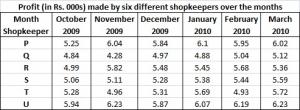
Question 5: What is the respective ratio between the profit earned by shopkeeper U in the months February 2010 and March – 2010 together to that earned by shopkeeper Q in the same months ?
a) 637: 512
b) 621 : 508
c) 512: 637
d) 508: 621
e) None of these
Question 6: What is the percent increase in profit of shopkeeper S in the month of December – 2009 over the previous month ? (rounded off to two digits after decimal)
a) 3.15
b) 2.67
c) 2.18
d) 3.33
e) None of these
Question 7: Which shopkeeper’s profit kept increasing continuously over the given months ?
a) R
b) Q
c) T
d) U
e) None of these
Question 8: What is the difference in profit earned by shopkeeper T in January – 2010 from the previous month ?
a) Rs. 640/-
b) Rs. 420/-
c) Rs. 380/-
d) Rs. 760/-
e) None of these
Question 9: What was the average profit earned by shopkeeper R in the months of October 2009 and November 2009 together ?
a) 5405
b) 5040
c) 4825
d) 4950
e) None of these
IBPS PO Previous Papers (Download Pdf)
Instructions
Direction: Study the given graph carefully to answer the questions that follow:
Number of days taken by three carpenters to finish making one piece each of four different items of furniture
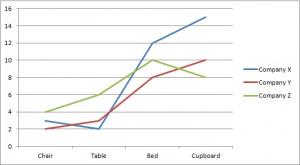
Question 10: If Carpenter X and Carpenter Y were to make a chair together how many days would they take?
a) 1 day
b) 4 days
c) 3 days
d) 2 days
e) None of these
Question 11: If Carpenters X, Y and Z were to make a table together how many days would they take ?
a) 4 days
b) 3 days
c) 1 day
d) 2 days
e) None of these
Question 12: What is the total number of days that Carpenter Z will take to make one piece each of all the four items together ?
a) 32 days
b) 24 days
c) 26 days
d) 28 days
e) None of these
Instructions
Direction: Study the given graph carefully to answer the questions that follow
Number of days taken by three carpenters to finish making one piece each of four different items of furniture
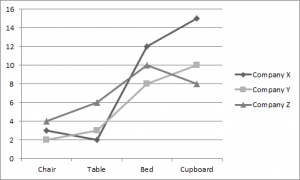
Question 13: If Carpenters X, Y and Z were to make a table together how many days would they take ?
a) 4 days
b) 3 days
c) 1 day
d) 2 days
e) None of these
Instructions
Direction: Study the given table carefully to answer the questions that follow:
Number of people staying in five different localities and the percentage breakup of men, women and children in them
LOCALITY TOTAL NO. PERCENTAGE OF PEOPLE MEN WOMEN CHILDREN
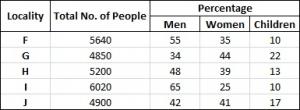
Question 14: Total number of people staying in locality J forms approximately what percent of the total number of people staying in locality F ?
a) 81
b) 72
c) 78
d) 93
e) 87
Question 15: What is the total number of children staying in localities H and I together ?
a) 1287
b) 1278
c) 1827
d) 1728
e) None of these
Question 16: The number of women staying in which locality is the highest ?
a) H
b) J
c) F
d) G
e) None of these
Question 17: What is the total number of men and children staying in locality I together
a) 4115
b) 4551
c) 4515
d) 4155
e) None of these
Question 18: What is the respective ratio of number of men staying in locality F to the number of men staying in locality H ?
a) 517: 416
b) 403: 522
c) 416: 517
d) 522: 403
e) None of these
Instructions
Direction: Study the following tables carefully and answer the questions given below:
Number of Candidates appeared in a Competitive Examination from five centres over the years
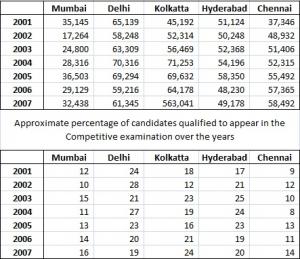
Question 19: In which of the following years was the difference in number of candidates appeared from Mumbai over the previous year the minimum ?
a) 2004
b) 2006
c) 2007
d) 2002
e) None of these
Question 20: In which of the following years was the number of candidates qualified from Chennai, the maximum among the given years ?
a) 2007
b) 2006
c) 2005
d) 2003
e) None of these
IBPS PO Important Questions PDF
Free Banking Study Material (15,000 Solved Questions
Answers & Solutions:
1) Answer (E)
Boys : Girls = 7 : 5
No. of boys = 7/12 * 1560 = 910
No. of girls = 650
No. of boys enrolled in only Dancing = 910/5 = 182
No. of girls in only Painting = 650/5 = 130
No. of boys in only singing = 91
No. of girls in both singing and dancing = 24/100 * 650 = 156
No. of girls in only Singing = 91*2 = 182
No. of boys in all three = 1/13 * 910 = 70
No. of girls in both dancing and painting = 8/100 * 650 = 52
No. of girls in only dancing = 650/10 = 65
So, no. of boys in both dancing and painting = 2*52 = 104
No. of girls in all three = 65


No. of boys in both singing and dancing = 156/2 = 78
No. of boys in only painting = 385
Total number of girls in Singing = 403
Required ratio = 403/1560 = 26% approximately
2) Answer (A)
Boys : Girls = 7 : 5
No. of boys = 7/12 * 1560 = 910
No. of girls = 650
No. of boys enrolled in only Dancing = 910/5 = 182
No. of girls in only Painting = 650/5 = 130
No. of boys in only singing = 91
No. of girls in both singing and dancing = 24/100 * 650 = 156
No. of girls in only Singing = 91*2 = 182
No. of boys in all three = 1/13 * 910 = 70
No. of girls in both dancing and painting = 8/100 * 650 = 52
No. of girls in only dancing = 650/10 = 65
So, no. of boys in both dancing and painting = 2*52 = 104
No. of girls in all three = 65


No. of boys in both singing and dancing = 156/2 = 78
No. of boys in only painting = 385
Number of students enrolled in all 3 = 135
3) Answer (A)
Boys : Girls = 7 : 5
No. of boys = 7/12 * 1560 = 910
No. of girls = 650
No. of boys enrolled in only Dancing = 910/5 = 182
No. of girls in only Painting = 650/5 = 130
No. of boys in only singing = 91
No. of girls in both singing and dancing = 24/100 * 650 = 156
No. of girls in only Singing = 91*2 = 182
No. of boys in all three = 1/13 * 910 = 70
No. of girls in both dancing and painting = 8/100 * 650 = 52
No. of girls in only dancing = 650/10 = 65
So, no. of boys in both dancing and painting = 2*52 = 104
No. of girls in all three = 65


No. of boys in both singing and dancing = 156/2 = 78
No. of boys in only painting = 385
Required percentage = 38.67%
4) Answer (C)
Boys : Girls = 7 : 5
No. of boys = 7/12 * 1560 = 910
No. of girls = 650
No. of boys enrolled in only Dancing = 910/5 = 182
No. of girls in only Painting = 650/5 = 130
No. of boys in only singing = 91
No. of girls in both singing and dancing = 24/100 * 650 = 156
No. of girls in only Singing = 91*2 = 182
No. of boys in all three = 1/13 * 910 = 70
No. of girls in both dancing and painting = 8/100 * 650 = 52
No. of girls in only dancing = 650/10 = 65
So, no. of boys in both dancing and painting = 2*52 = 104
No. of girls in all three = 65


No. of boys in both singing and dancing = 156/2 = 78
No. of boys in only painting = 385
Required ratio = 130:385 = 26:77
5) Answer (B)
Profit of shopkeeper U in Feb – March 2010 = 6.19 + 6.23 = 12.42
Profit of shopkeeper Q in Feb – March 2010 = 5.04 + 5.12 = 10.16
Ratio = 12.42:10.16 = 6.21:5.08 = 621:508
6) Answer (D)
Profit of S in Nov 2009 = 5.11
Profit in Dec 2009 = 5.28
% increase = 0.17/5.11 * 100 = 3.3%
7) Answer (E)
R’s profit decreased in Dec 2009, Q’s in Jan 2010, T’s in Feb 2010, U’s in Dec 2009. So, the answer is e).
8) Answer (C)
Profit in January 2010 = 5690
Profit in December 2009 = 5310
Difference = Rs 380
9) Answer (A)
Profit earned in October 2009 = 4990
Profit earned in November 2009 = 5820
Average profit in these two months = (4990+5820)/2 = 5405
10) Answer (E)
Number of days required = 1/(1/2+1/3) = 1/(5/6) = 6/5 days.
So, option e).
11) Answer (C)
Individually, they take 2, 3 and 6 days respectively to make the table.
So, their combined one day work = 1/2 + 1/3 + 1/6 = 1
So, the three of them can finish making a table in 1 day.
12) Answer (D)
Chair = 4 days
Table = 6 days
Bed = 10 days
Cupboard = 8 days
Total number of days needed = 28 days
13) Answer (C)
Individually, they take 2, 3 and 6 days respectively to make the table.
So, their combined one day work = 1/2 + 1/3 + 1/6 = 1
So, the three of them can finish making a table in 1 day.
14) Answer (E)
Percentage required = $\frac{4900}{5640}*100 = 86.7 => 87$ (Approx)
15) Answer (B)
Number of children in H = 13% of 5200 = 676
Number of children in I = 10% of 6020 = 602
Total number of children = 676+602 = 1278
16) Answer (D)
Number of women in F = 35% of 5640 = 1974
Number of women in G = 44% of 4850 = 2134
Number of women in H = 39% of 5200 = 2028
Number of women in I = 25% of 6020 = 1505
Number of women in J = 41% of 4900 = 2009
So highest number of women are in G
17) Answer (C)
Total number of men and children in I = 75% of 6020 = 4515
18) Answer (A)
Required ratio = 55% of 5640 : 48% of 5200 = 3102 : 2496 = 517 : 416
19) Answer (D)
The drastic fall of the number of candidates from 2001 (35,145) to 2002 (17,264) is 17,881.
In every other year (except a smaller drop from 2005-2006), the number of candidates has increased from one year to the next.
Hence, the correct answer is 2002
20) Answer (A)
In 2007, the highest number of candidates appeared for the exam from Chennai and the pass percentage is also the highest compared to the other years. So, the number of candidates from Chennai who passed in the exam is the highest in 2007.
The number equals 14%*58492 = 8189





